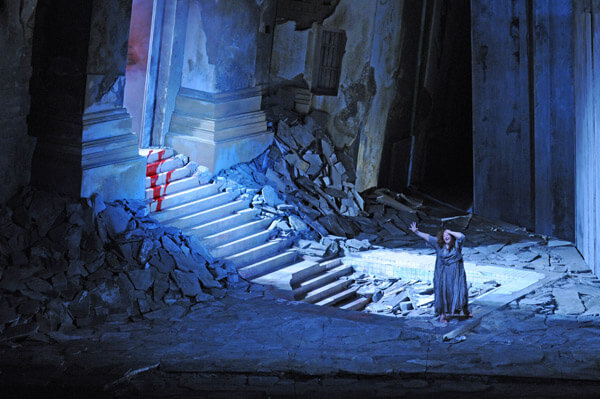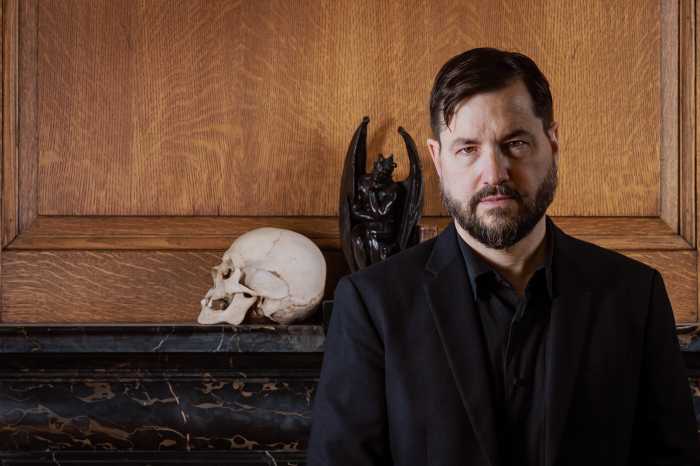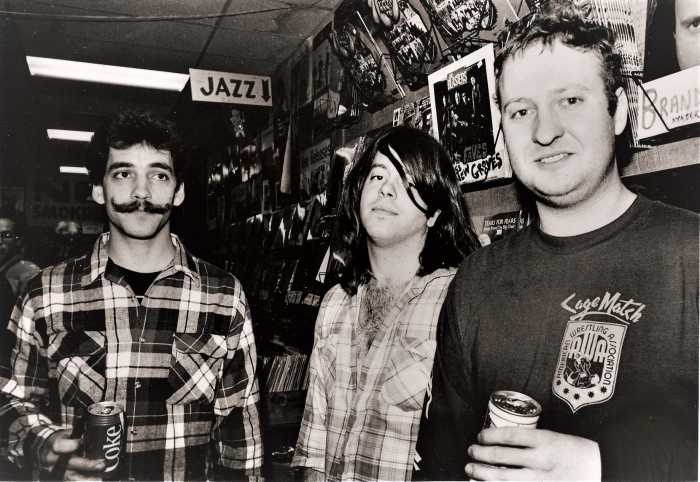USE ARTS Capuleti SHENGOLD.jpgJoyce DiDonato and Nicole Cabell in San Francisco Opera’s production of Bellini's “Capuleti.” | CORY WEAVER
There are many important operatic strongholds in North America, with varying emphases and strengths. Yet the two leading contenders outside of New York remain what they were 50 years ago — Chicago and San Francisco. Fortunately for LGBT audiences, both are queer destination cities with much else to recommend them. Both offered several outstanding evenings to a late October visitor.
On October 12, the San Francisco Symphony audience didn't seem to realize they were witnessing the local debut of one of the world's great conductors, Vladimir Jurowski. He offered an intriguing all-Russian program played with dynamic aplomb — though young Khatia Buniatishvili, dressed for Odette/ Odile, banged through the Rachmaninoff “Second” with brio but little depth.
The concert's vocal portion was the North American première of Atovmyan's arrangement of Prokofiev's mighty film score for “Ivan the Terrible.” It packed a genuine wallop, with Elena Zaremba, still able in the chest register, and Andrei Breus, rough but idiomatic in the Oprichnik's song with chorus, which is one of the weirdest, most homoerotic scenes in Eisenstein's masterwork. Ragnar Bohlin's chorus was superb.
The opera company offered three appetizing choices that weekend, and I noticed several visiting New Yorkers in the audience. Bellini's “Capuleti” (October 19), quite cogently and propulsively conducted by Riccardo Frizza, delivered in the most important way — the two leads, Joyce diDonato and Nicole Cabell, offered lovely, expertly vocalized performances of great feeling. Cabell's Giulietta was made to literally climb the walls and sing on a sink by Vincent Boussard's rather hideous production — not full-out Eurotrash but clothed by Christian Lacroix (!) in Dickensian solemnity and squalor, with choristers moving like “Walking Dead” extras and female extras parading in drag-like bordello wear. Yet Cabell provided real beauty of tone and line. A lyric soprano can master this bel canto part.
Fully steeped in bel canto phrasing and decoration, diDonato gave lessons in restraint and emotion in Romeo's quieter music — a tomb scene for the ages. The warrior's big cabaletta stretches a singer more, but diDonato masterfully deployed vocal color and rhythmic accent to achieve a martial effect.
Ao Li voiced a stylish Lorenzo, but Saimir Pirgu (Tebaldo) was distressingly off-form and Eric Owens' considerable gifts seemed wasted on Capulet. Met audiences have never heard “Capuleti”; I'm just saying.
The next night brought a very fine “Lohengrin” — a generally reasonable Hungarian Uprising Update by Daniel Slater previously seen in Houston. Music director Nicola Luisotti, new to Wagner, supplied the virtues of transparency and line, though the ethereal “Prelude” emerged so distended as to threaten unraveling strings and the wonderful second act seemed endless. Wagnerian opening nights rarely feature great brass playing; this was no exception. One sensed that orchestral matters would improve with repetition.
Brandon Jovanovich — always a handsome and intelligent stage actor — made a substantive role debut in the lead, pacing himself with care and giving full weight to the words. Rather like Wieslaw Ochman, who sang Wagner's Erik at SFO, Jovanovich seemed to employ two techniques — a lovely, croony but seemingly always supported head voice for the entry and many quieter passages as well as a louder, more incisive, and somewhat harder delivery for more martial utterances. In the latter mode, high notes were captured and released almost immediately. It worked, yielding a commendable, involving portrayal, but one wonders a bit how many “Lohengrin” runs he'd be wise to schedule.
Finnish soprano Camilla Nylund, debuting locally, made a satisfying if not particularly distinctive Elsa. Her lyric sound is clean if somewhat wan in color, but she was always stylish, steady, and audible — an honorable, moving exponent of a great role that these days is often cast purely for looks.
After being audibly ill for SFO”s June “Magic Flute,” Kristinn Sigmundsson (King) clearly proved himself back in form; the Icelandic bass has a little passing rust every now and again at register extremes, but is still one of the world's leading Germanic basses. Brian Mulligan (Herald) sounded excellent, acting with apt pomposity.
In previous SFO “Lohengrin” stagings, the “baddies” cleaned up — Eva Randova/ Sergei Leiferkus (1989) and Elizabeth Connell / Tom Fox (1996) left impressions unmatched by Petra Lang's Ortrud and Gerd Grochowski's Telramund. Way too bright in voice, working hard at the top, Lang made rather perfunctory textual contact (in her native language!) and emerged merely serviceable — despite the inevitable queenly ovations Ortrud always garners. Grochowski sounded one size too small for his role, furnishing a virtual imitation of Dietrich Fischer-Dieskau's barky, verbally hammy recorded account. Withal, I wished I could have heard this “Lohengrin” again.
The same goes for seeing Leonard Foglia's extraordinarily accomplished production of Jake Heggie's 2010 “Moby-Dick” again (October 21); fortunately, it was taped for telecasting. Heggie's score, well led by Patrick Summers, does not exactly surprise — a large debt is owed to the Britten estate in particular — but it does please and hold the interest in terms of orchestration and vocal writing. The crowd scenes work particularly well. Until one overlong Act Two scene between Ahab and Starbuck, the pacing is quite taut, thanks in part to a well-judged libretto by Gene Scheer — by light years stronger than those of previous Heggie operas.
The entire ensemble was anchored not by the fanatic Ahab (Jay Hunter Morris, with fantastic diction and aptly out-there theatrics compensating for a tenor of uneven, if sometimes trenchant, production and quality) or the very appealingly vocalized Greenhorn/ Ishmael of Stephen Costello (much more animated than usual), but by the beautifully sung and acted Starbuck of Morgan Smith. The Leipzig-based American baritone looks ripe for a major career.
Jonathan Lemalu brought dignified stature to Queequeg, despite resolutely ordinary vocal material. Lyric-coloratura soprano Talise Trevigne proved affecting and delightful vocally as Pip, the cabin boy.
The breathtaking, innovative multimedia production was all the things the Met “Ring” is claimed to be and isn't. Sets (Robert Brill), projections (Elaine J. McCarthy), and lighting (Don Holder) deserve acclaim, and Ian Robertson's chorus earned their cheers.
The next evening, Lyric Opera of Chicago's phenomenal Art Deco auditorium hosted Christine Goerke's triumphant Elektra, a relatively new impersonation, but — now that Deborah Polaski has retired the demanding marathon role — surely the top choice worldwide. Goerke's still-growing dramatic soprano dominated Andrew Davis' surging orchestra — no mean feat — remaining attractive virtually throughout. David McVicar's elemental, blood-drenched staging —which needed less distraction from supers and comprimarios — concentrated usefully and movingly on the Atreus family interrelations.
Christine Goerke triumphant turn as Elektra at the Lyric Opera of Chicago. | ROBERT KUSEL
In that framework, Goerke offered a generous, deeply conflicted Elektra, listening and responding to every word uttered around her. In future outings — soon, please, at Lincoln Center — she might reel back a notch on little added giggles. To quote Rimsky-Korsakov, “Operatic singers are in the habit of introducing ejaculations, spoken words, etc., into the music, thereby hoping to produce dramatic, comic, or realistic effect. Far from adding significance to the music, these additions and emendations merely disfigure it.” But Goerke's brilliant performance deserved every minute of the screaming ovation she received.
Out and proud Jill Grove aced her first Klytaemnestra, voicing the chilling lines with uncommon tonal beauty, and Alan Held's sturdy Orest and Goerke made the tricky Recognition Scene remarkably moving. Emily Magee, while idiomatic and committed, worked as hard as most Chrysothemises and lacked radiance. Roger Honeywell's incisive tenor fueled a detailed, creepily louche Aegisth. Kiri Deodarine's Confidante stood out for sheer vocal star quality.
Star quality certainly presided over October 24's “Simon Boccanegra,” in a sensible if tradition-bound production by Elijah Moshinsky. Davis led a sweeping traversal of Verdi's dark-hued, astonishing score. Towering above everyone, the wrenchingly etched Fiesco of Ferruccio Furlanetto reinforced his near-legendary status as the Last Big-Time Italian Bass. When do we hear his Boris in New York?
The performance also featured the kind of clarion, huge format, marbled singing that bespeaks a world class “American Verdi baritone.” It came from Quinn Kelsey as Paolo, the fifth-billed baddie done in past decades by future Boccanegras like Leonard Warren and Sherrill Milnes. Kelsey, terrific, will surely join their ranks.
If musicality and intelligence could validate a Boccanegra, Thomas Hampson might qualify, but in this role, like Macbeth, he overinflates his lyric sound, often taking on an unpleasant woody timbre. Not a disaster, but not a Boccanegra either. As the romantic pair, Krassimira Stoyanova and Frank Lopardo, coped resourcefully and with fine effect with roles in which a bit more heft might help. Stoyanova only indicated trills, but her sense of line and dynamics indicated a superior musician, and the tone was largely lovely. Don't miss her Met Desdemona this spring.
Lopardo had one or two awkward moments with head tones but by and large sounds remarkably ringing and fresh, certainly streets ahead of several young tenors the New York company now deploys in Lopardo's repertory. One left both Lyric performances delighted in the quality of the works performed.
The Chicago Symphony's “Missa Solemnis” (October 25) also proved highly stirring. Veteran Bernard Haitink channeled Beethoven's weird late-career ethos to fine effect. I'm used to hearing great playing from the CSO, and concertmaster Robert Chen deserved more acknowledgment for his exquisite work in the sublime “Sanctus.” But the chorus under Duain Wolfe gave the best live performance I have heard from it. Erin Wall — showing spectacular control and lovely tone — and rich-voiced Bernarda Fink could hardly have been bettered. Anthony Dean Griffey drew beautiful tenor lines. By contrast, bass-baritone Hanno Mueller-Brachmann — sounding muffled and top-challenged — seemed an unnecessary import.
I also saw a well-considered “Sunday in the Park with George,” capably staged by Gary Griffin at Chicago Shakespeare (October 23), out on the festive if mall-like Navy Pier. Sondheim's cleverness both dazzles and cloys here; James Lapine's almost completely meretricious book ensures any director and cast major second act problems.
Jason Danieley made a charming, very worthy George, convincing in both of the musical's time frames (the second, the '80s art world, seems as much “period” now as the era of Seurat). Nice to hear George's high-lying music sung by a well-trained lyric tenor and not bleated.
Carmen Cusack, inconsistently vocalizing the twin “Bernadette Peters” roles, oddly alternated sly charm with mannered affect. Linda Stephens, playing Seurat's mother and a prickly art critic, stood out from an affable, clearly gifted cast for emotional resonance and sheer acting technique.
David Shengold writes about opera for many venues.





































